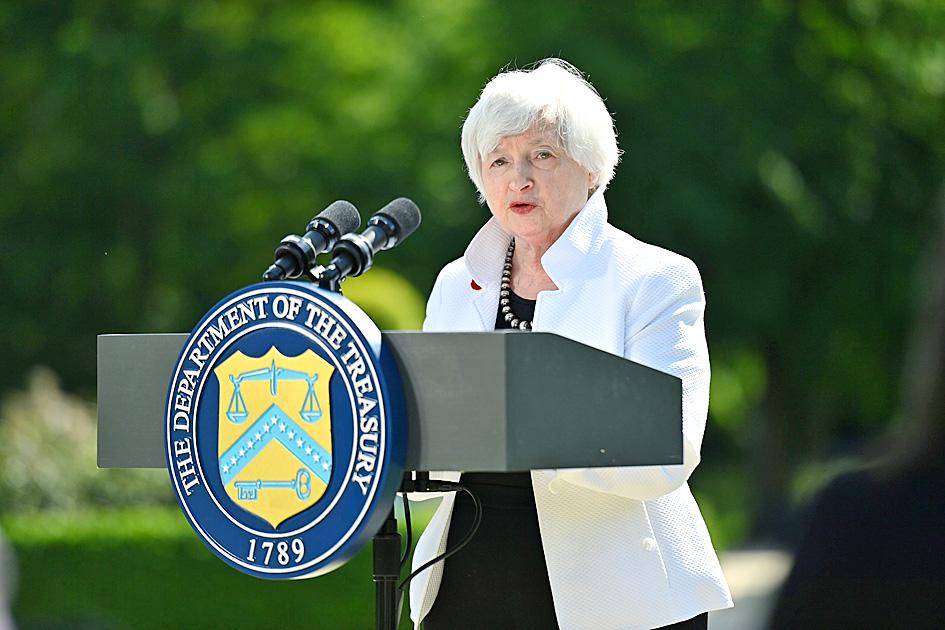US Secretary of the Treasury Janet Yellen on Sunday said that US President Joe Biden’s US$4 trillion spending plan would be good for the US, even if it contributes to rising inflation and results in higher interest rates.
“If we ended up with a slightly higher interest rate environment, it would actually be a plus for society’s point of view and the Fed’s point of view,” Yellen said in an interview with Bloomberg News during her return from the G7 finance ministers’ meeting in London.
The debate around inflation has intensified in recent months, between those like Yellen who argue that current price increases are being driven by transitory anomalies created by the COVID-19 pandemic — such as supply-chain bottlenecks and a surge in spending as economies reopen — and critics who say trillions in government aid could fuel a lasting spike in costs.

Photo: Reuters
Biden’s packages would add up to about US$400 billion in spending per year, she said, adding that it is not enough to cause an inflation overrun.
Any “spurt” in prices resulting from the rescue package would fade away next year, she said.
“We’ve been fighting inflation that’s too low and interest rates that are too low now for a decade,” the former US Federal Reserve chair said, adding that “we want them to go back to” a normal interest rate environment, “and if this helps a little bit to alleviate things then that’s not a bad thing — that’s a good thing.”
The headline measure of consumer prices rose 4.2 percent in the 12 months through April, and the numbers for last month are due to be published on Thursday.
The Fed has committed to only start scaling back the US$120 billion monthly pace of its asset purchases after there is “substantial further progress” on inflation and employment.
US job growth picked up last month — along with workers’ pay — and the unemployment rate fell to 5.8 percent, a US Department of Labor report on Friday showed.
Asian stock markets were mixed yesterday as investors mulled comments by Yellen on interest rates and weighed the impact of the G7 global tax plan on tech giants.
Hong Kong was down 0.7 percent, Sydney was off 0.2 percent and Taipei slipped 0.4 percent.
Tokyo trimmed earlier gains, but still closed up 0.3 percent, Seoul added 0.4 percent and Singapore was 0.7 percent higher, while Shanghai recovered from an early dip to end 0.2 percent higher.
Additional reporting by AFP

South Korea’s equity benchmark yesterday crossed a new milestone just a month after surpassing the once-unthinkable 5,000 mark as surging global memory demand powers the country’s biggest chipmakers. The KOSPI advanced as much as 2.6 percent to a record 6,123, with Samsung Electronics Co and SK Hynix Inc each gaining more than 2 percent. With the benchmark now up 45 percent this year, South Korea’s stock market capitalization has also moved past France’s, following last month’s overtaking of Germany’s. Long overlooked by foreign funds, despite being undervalued, South Korean stocks have now emerged as clear winners in the global market. The so-called “artificial intelligence

‘SEISMIC SHIFT’: The researcher forecast there would be about 1.1 billion mobile shipments this year, down from 1.26 billion the prior year and erasing years of gains The global smartphone market is expected to contract 12.9 percent this year due to the unprecedented memorychip shortage, marking “a crisis like no other,” researcher International Data Corp (IDC) said. The new forecast, a dramatic revision down from earlier estimates, gives the latest accounting of the ongoing memory crunch that is affecting every corner of the electronics industry. The demand for advanced memory to power artificial intelligence (AI) tasks has drained global supply until well into next year and jeopardizes the business model of many smartphone makers. IDC forecast about 1.1 billion mobile shipments this year, down from 1.26 billion the prior

Chinese artificial intelligence (AI) start-up DeepSeek’s (深度求索) latest AI model, set to be released as soon as next week, was trained on Nvidia Corp’s most advanced AI chip, the Blackwell, a senior official of US President Donald Trump’s administration said on Monday, in what could represent a violation of US export controls. The US believes DeepSeek will remove the technical indicators that might reveal its use of American AI chips, the official said, adding that the Blackwells are likely clustered at its data center in Inner Mongolia, an autonomous region of China. The person declined to say how the US government received

FORTUNES REVERSED: The new 15 percent levies left countries with a 10 percent tariff worse off and stripped away the advantage of those with a 15 percent rate In a swift reversal of fortunes, countries that had been hardest hit by US President Donald Trump’s tariffs have emerged as the biggest winners from the US Supreme Court’s decision to strike down his emergency levies. China, India and Brazil are among those now seeing lower tariff rates for shipments to the US after the court ruled Trump’s use of the International Emergency Economic Powers Act to impose duties was illegal. While Trump subsequently announced plans for a 15 percent global rate, Bloomberg Economics said that would mean an average effective tariff rate of about 12 percent — the lowest since